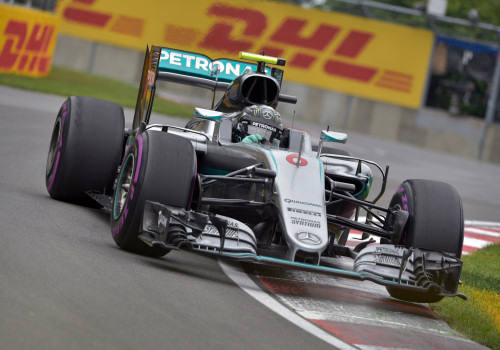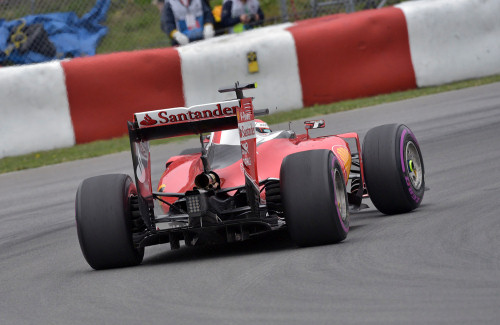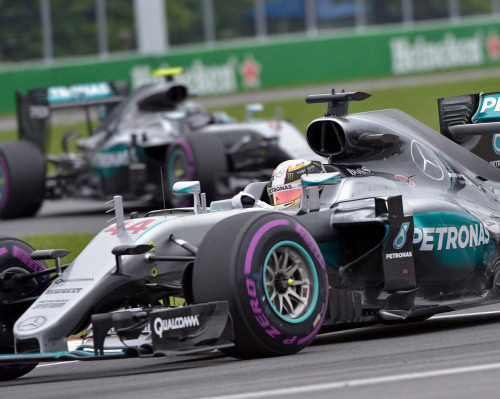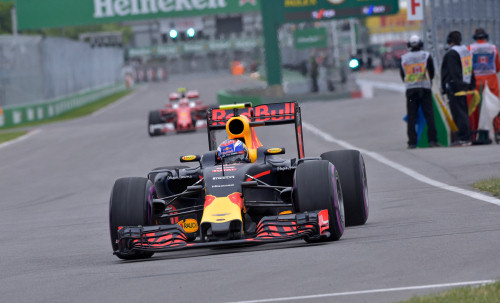The Way It Is/ Sharing Formula 1's lavish pieby Gordon Kirby |
 Porsche scored a surprise 18th win at Le Mans this year as the leading Toyota faltered in the race's closing minutes after dominating most of the race. The world's most renowned long-distance race also provided an impressive debut class win for Ford's new, mid-engined GT car run by Chip Ganassi's team and driven by Dirk Muller/Joey Hand/Sebastien Bourdais. And the first Azerbaijan GP was won easily by Nico Rosberg who scored his fifth win of the year and extended his championship lead over teammate Lewis Hamilton.
Porsche scored a surprise 18th win at Le Mans this year as the leading Toyota faltered in the race's closing minutes after dominating most of the race. The world's most renowned long-distance race also provided an impressive debut class win for Ford's new, mid-engined GT car run by Chip Ganassi's team and driven by Dirk Muller/Joey Hand/Sebastien Bourdais. And the first Azerbaijan GP was won easily by Nico Rosberg who scored his fifth win of the year and extended his championship lead over teammate Lewis Hamilton.
Both Le Mans and Formula 1 are thriving technically and enjoy much bigger global markets than any other form of motor sport. For its part, F1 has made the decision to go for both more downforce next year and more grip too from larger wheels and tires. Niki Lauda says next year's cars will be five seconds per lap quicker than this year's cars and most people in the F1 paddock are fans of the new formula, including Red Bull's team principal Christian Horner. "It's exciting," Horner says. "I think all engineers relish changes within the technical regulations. That applies to the chassis guys as much as it does to the engine guys. I think what we're seeing is the engines are converging. I think the (Renault) guys in Viry have done a great job over the last six months. Progress is coming on the engine front and with a shake-up in the chassis regulations, inevitably some teams will get it right and some teams won't. Hopefully, we'll be one of the former."  © Gary Gold Commented Ferrari engineer Jock Clear: "From an engineering point of view, as Christian says, we all relish all sorts of development in any area and any change in regulations is seen as an opportunity to steal a yard on the opposition. We're excited about next year in every respect. You just get on with what you've got to get on with. "So we don't really look at the big picture. As engineers, we don't look at the bigger picture of whether this is going to be holistically a better solution for the sport. The engineers themselves just say, 'Right, this is the challenge that the regulations have now set me. Let's get on with it.' And that's what we're doing quite aggressively at Maranello right now." Meanwhile, energetic debate continues about the system Bernie Ecclestone uses to pay the teams from his vast pool of income from TV rights, sponsors and prize money. "My view is quite simplistic on this," Horner says. "The business belongs to the promoter. It's down to them how they want to promote the sport and how they want to generate the funding and the distribution. They've got to make a decision of can they afford a big offset in payments or should it be more evenly distributed, but that's their business. It's their job to decide what's best for the sport. "I think where it all gets very blurred is when everybody starts messing in everybody else's business. I think that's where we constantly run into trouble. If you keep it simple, keep it straightforward, then it should be a very straightforward negotiation. It won't be. We all know that, but this is an idealistic view I have." Added Horner: "The commercial rights holder holds the financial keys. It's down to the rights holder to decide how they're going to distribute the revenue and then it's down to the teams to decide whether they want to compete or not. "It's still some way away. We're talking about 2020, which is the end of this agreement. I would envisage that talks would start over the next twelve or 24 months, but it's impossible really to predict.  © Gary Gold Force India's Bob Fernley has a different view. "I would probably come at it from a slightly different angle than Christian," Fernley comments. "I hope we would do things differently. The idea of privileged teams going away negotiating with CVC and deciding how much to skim off the top before distribution to other teams, for me, is not acceptable. "I would like to think the commercial rights holder this time does it in a more transparent way. The Premier League is a perfect example of where you've got a performance-related program that's very fair and transparent. There's no need for negotiations. We've got a pot of money that needs to be split in a proper manner. Make it transparent and the teams can take it or leave it." Fernley points out some of the key issues from his perspective. "First of all we've got a payment scheme that only pays into ten teams," he says. "So we have to decide if we're going to have ten, eleven or twelve teams. Even this year, you are going to have a situation where perhaps eleven into ten doesn't go. "If we move on from that, each team is really paying the same amount of money to put the show on. There's very little difference between what Ferrari, Red Bull and Haas have to pay to get here, to put the show on, to put a chassis in place and get the drivers out. The difference is the development costs and the development costs are something that even though we would like to control it, we've been unable to do so. "I think that as each team is paying roughly the same amount of money, each team should have a say in what's going on," Fernley adds. "So I am a great believer that the strategy group should be replaced, as it was before, with each team represented."  © Gary Gold "I think it should be more equal, but the best teams should get more because they're better, they're winning," Steiner says. "Is it distributed wrong at the moment? As Christian said, if the management did a good job to negotiate for their own company, you cannot blame them. There's nothing wrong with that. The people in the back next time need to make sure that we are happy going forward. "I think it will be something in between, but once we start to negotiate I think it will get a little bit more transparent. But again, the teams which are good and are winning and are there for a long time, if you were in that position you would ask for more of the revenue. It's something in between being completely equal for everybody and being unbalanced. "Let's see what the next 12-24 months bring when negotiations start. Next time, we (Team Haas) will be involved. This time we knew what we were going into, so we cannot be happy or unhappy. We took the fact for what it is. Other people negotiated, but next time we will play a part in it and voice our opinion." Toro Rosso team principal Franz Tost says a more equitable pay-out will help teams like his. "I hope that the private teams get more money and we can close the gap from the performance side because the manufacturer teams anyway have a lot of money," Tost observes. "It is simply a question of the financial situation." Adds ex-McLaren man Dave Ryan who is Manor Racing's new team principal. "For sure it would be nice to think it could be made more equitable," Ryan comments. "The difference between the front teams and the back teams is too big. I do believe the leading teams should get more money, but I think the gap is just massive at the moment and it needs to be looked at in a slightly different manner."  © Gary Gold "I think Heineken is fantastic for Formula 1," Bob Fernley commented. "Obviously, the teams will benefit from that, but in order to get it more balanced we need to get the distribution right. The mix between TV money and sponsorship money is changing and has changed hugely over the last couple of years. We need to address that. "Sponsorship is now getting confused a little bit between circuit sponsorship and team sponsorship. The teams are finding it harder and harder to land the bigger sponsors. It's more competitive." Added Christian Horner: "The great thing about the Heineken deal is that it's a great brand and it's undoubtedly a significant amount of investment into the sport over the next few years. Every single team will benefit from Heineken's involvement in the sport through the distribution portals that the money filters its way into the teams. I think it's a positive thing, a good thing. There are some great brands involved in Formula 1 now." Formula 1 faces many longterm problems but there's no doubt that Bernie Ecclestone continues to successfully nurture the spending commitment and marketing clout of the World Championship's high visibility, brand name sponsors. Last year, F1's ten teams collectively took in $750 million in sponsorship, down some $200 million from 2012's high point. But F1's overall pie is as large and sumptuous as ever and the squabble over who will get how much of the pie is sure to continue over the next year or two, if not forever. |
|
Auto Racing ~ Gordon Kirby
Copyright ~ All Rights Reserved |
